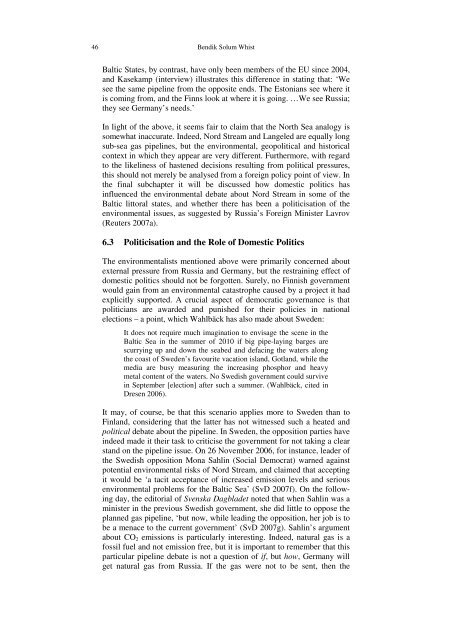Nord Stream: Not Just a Pipeline
Nord Stream: Not Just a Pipeline
Nord Stream: Not Just a Pipeline
You also want an ePaper? Increase the reach of your titles
YUMPU automatically turns print PDFs into web optimized ePapers that Google loves.
46 Bendik Solum Whist<br />
Baltic States, by contrast, have only been members of the EU since 2004,<br />
and Kasekamp (interview) illustrates this difference in stating that: ‘We<br />
see the same pipeline from the opposite ends. The Estonians see where it<br />
is coming from, and the Finns look at where it is going. …We see Russia;<br />
they see Germany’s needs.’<br />
In light of the above, it seems fair to claim that the North Sea analogy is<br />
somewhat inaccurate. Indeed, <strong>Nord</strong> <strong>Stream</strong> and Langeled are equally long<br />
sub-sea gas pipelines, but the environmental, geopolitical and historical<br />
context in which they appear are very different. Furthermore, with regard<br />
to the likeliness of hastened decisions resulting from political pressures,<br />
this should not merely be analysed from a foreign policy point of view. In<br />
the final subchapter it will be discussed how domestic politics has<br />
influenced the environmental debate about <strong>Nord</strong> <strong>Stream</strong> in some of the<br />
Baltic littoral states, and whether there has been a politicisation of the<br />
environmental issues, as suggested by Russia’s Foreign Minister Lavrov<br />
(Reuters 2007a).<br />
6.3 Politicisation and the Role of Domestic Politics<br />
The environmentalists mentioned above were primarily concerned about<br />
external pressure from Russia and Germany, but the restraining effect of<br />
domestic politics should not be forgotten. Surely, no Finnish government<br />
would gain from an environmental catastrophe caused by a project it had<br />
explicitly supported. A crucial aspect of democratic governance is that<br />
politicians are awarded and punished for their policies in national<br />
elections – a point, which Wahlbäck has also made about Sweden:<br />
It does not require much imagination to envisage the scene in the<br />
Baltic Sea in the summer of 2010 if big pipe-laying barges are<br />
scurrying up and down the seabed and defacing the waters along<br />
the coast of Sweden’s favourite vacation island, Gotland, while the<br />
media are busy measuring the increasing phosphor and heavy<br />
metal content of the waters. No Swedish government could survive<br />
in September [election] after such a summer. (Wahlbäck, cited in<br />
Dresen 2006).<br />
It may, of course, be that this scenario applies more to Sweden than to<br />
Finland, considering that the latter has not witnessed such a heated and<br />
political debate about the pipeline. In Sweden, the opposition parties have<br />
indeed made it their task to criticise the government for not taking a clear<br />
stand on the pipeline issue. On 26 November 2006, for instance, leader of<br />
the Swedish opposition Mona Sahlin (Social Democrat) warned against<br />
potential environmental risks of <strong>Nord</strong> <strong>Stream</strong>, and claimed that accepting<br />
it would be ‘a tacit acceptance of increased emission levels and serious<br />
environmental problems for the Baltic Sea’ (SvD 2007f). On the following<br />
day, the editorial of Svenska Dagbladet noted that when Sahlin was a<br />
minister in the previous Swedish government, she did little to oppose the<br />
planned gas pipeline, ‘but now, while leading the opposition, her job is to<br />
be a menace to the current government’ (SvD 2007g). Sahlin’s argument<br />
about CO2 emissions is particularly interesting. Indeed, natural gas is a<br />
fossil fuel and not emission free, but it is important to remember that this<br />
particular pipeline debate is not a question of if, but how, Germany will<br />
get natural gas from Russia. If the gas were not to be sent, then the













